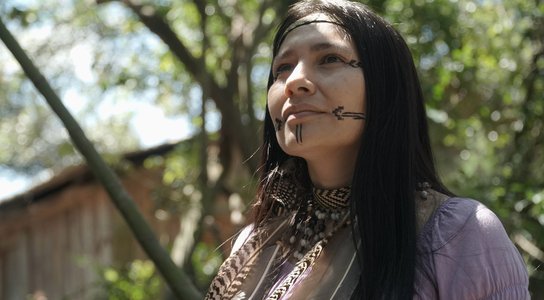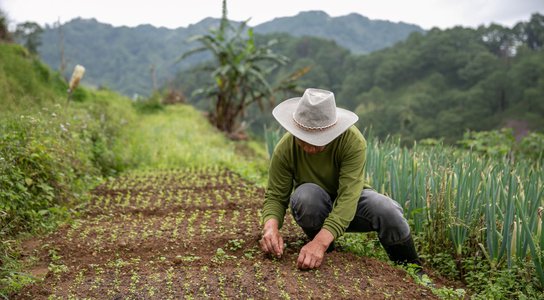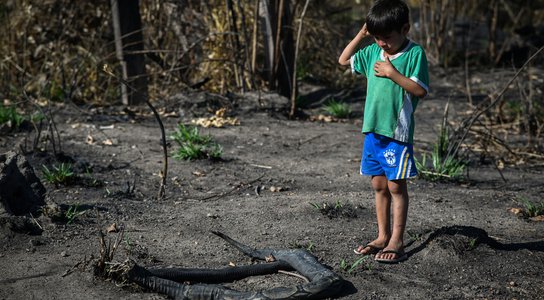The violence against people comes with the violence against nature. The people in Europe don’t know that they are consuming meat tainted with human blood. - Polliane Barbosa Santos Reis, Land Defender and representative of the Landless Rural Workers Movement (MST), Brazil
In 2014, Pollianne Barbosa Santos Reis joined a community of thousands who had returned to their home on public land in the Brazilian Amazon state of Pará. In the years that followed, the community has been shot at and had their plantations and homes burned down, as a conflict with a local cattle ranch has escalated.
Despite this, JBS – the world’s largest meat processor, with operations in Europe – directly purchased cattle from ranch owner Rafael Saldanha for years, despite clear evidence of the ongoing land dispute.
The beef that you are eating today is beef that cost the life of a farmer here in Pará. - Polliane Barbosa Santos Reis
The expansion of ranching and plantations is at the heart of land conflicts in the Amazon, with around 30% of all registered land-related conflicts linked to the agribusiness sector.
Pará is at the epicentre of this conflict, as the state with the highest rate of deforestation in Brazil. This has gone hand-in-hand with an increase in violence against local communities across the country, with 1,496 murders of peasant workers recorded between 1995 and 2008, just 140 of which were prosecuted according to a survey by the Land Pastoral Commission (CPT).
It is against this backdrop of environmental destruction and impunity that Polianne’s community has found itself at the receiving end of violence, intimidation and threats.
Polliane’s community targeted by cattle rancher, Rafael Saldanha
In 2008, Polliane’s community – self-described as landless peoples – founded the Hugo Chavez settlement on an area of public land which, under Brazilian law, could not be bought or sold by ranchers. Their aim was to push local authorities to investigate whether a cattle ranch that overlapped into the area, Fazenda Santa Tereza, had been illegally purchased by the owner.
The following year, the ranch was acquired by Rafael Saldanha. Polliane’s community left the land after the questionable business deal, with guarantees that the rule of law would be upheld. They felt compelled to returned in 2014 after they suspected foul play in Saldanha’s acquisition of the area and feared their rights would not be respected.
Saldanha is reported to be among the most influential cattle ranchers in southern Pará. He is also accused of environmental crimes, historic land grabbing, and is embroiled in an ongoing murder case. In April 2019, Pará prosecutors charged him with illegally obtaining public land in relation to the Fazenda Santa Tereza ranch.
Saldanha stands accused by prosecutors of being involved in the murder of two representatives from Polliane’s organisation - the Landless Rural Workers’ movement (Movimento do Trabalhadores Rurais Sem Terra, or MST.) He is contesting a fine imposed by the Brazilian Ministry of Work for slave labour, and a separate state investigation discovered illegal deforestation at another of his ranches.
He has claimed that all allegations of human rights abuses put to him are false and denies being involved in the murder.
However, witnesses from Polianne’s community have told Brazilian authorities of the brutal treatment they have experienced at the hands of armed men they suspect represent the ranchers. One recounted how “they laid us down on the floor and shot close to our feet. They made us run away and then started burning our cars, motorbikes and huts, even throwing dogs alive into the fire, and then shooting toward us as we fled the scene.”
Only those that live here, that are under constant daily attack, know what it feels like to be in our skin. Know that the violence is much worse than what is reported. - Polliane Barbosa Santos Reis
The inadequacy of voluntary pledges
These testimonies, official investigations and allegations of murder, environmental destruction and human rights abuses were well-known when JBS was buying cattle from Rafael Saldanha. They finally stopped in 2021, after a Global Witness investigation.
And yet for years previously, JBS had committed to voluntary pledges to remove ranchers linked to land grabs from its supply chain.
This shows is that trying to cut out land grabs from your company’s operations does not work if you are policing yourself. Voluntary pledges simply do not work.
The current draft of a new EU law could help clean up companies’ overseas operations – and move away from empty voluntary pledges - but the text as it stands would fail to protect communities like Pollianne’s.
The law aims to make companies operating in the EU carry out
checks to help eliminate human rights and environmental abuses in their
international value chains. However, it does not require companies like JBS to
meaningfully engage with communities who could be threatened by their
operations. It also obliges communities to overcome complex legal obstacles if
they want justice.
At an online event organised by Global Witness on May 30, which brought Polliane together with EU decision-makers and policy experts to discuss the law, Lara Wolters MEP explained:
“We are living in a world that was built for large international companies to be able to make profits and was built – legally – for them to be protected in whatever they do, rather than being held to account.”
Ms Wolters mentioned that three core pieces are missing from the law for it to protect people and help them seek justice: making it mandatory for companies to consult with local communities, reducing some of the legal obstacles that plaintiffs have to overcome, and providing remedy for victims in situations where companies didn’t conduct proper due diligence.
The thing that this law would bring if we get this right would be an end to impunity and greed, and making sure that companies are no longer able to look able to look away, are no longer able to say ‘but I had no idea that my beef came from a conflict region. - Lara Wolters MEP
As the EU moves into negotiations to finalise this law, it must keep the needs of communities like Pollianne’s front and centre, and require companies to listen. That means engaging communities in a safe, inclusive, and ongoing way, not just when it serves companies’ financial interests.
Watch a recording of the event here:
Author
-
Aurelie Skrobik
Campaigner, Corporate Accountability


